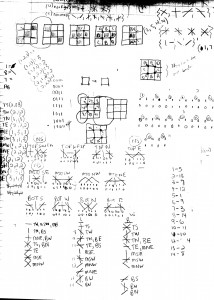Rhem 3
I earlier wrote about my experience
with Knut Muller’s Rhem 2, and I gave the third game a shot over the
last few days. I came infinitesimally close to solving it without any
hints. No puzzles or missing information thwarted me; I merely failed to
see something in plain sight. I don’t know if my last post captured how
complex the game is. Here are some notes I made while attempting to
solve a problem with incomplete
information:
Needless to say, all of this turned out to be wrong. I filled thirteen pages of 9 1/4" by 11 3/4" quadrille with increasingly esoteric sigils, irresponsible conjectures, and unconfirmable hypothetics before turning in abject despair and shame to the walkthrough, where I found that I had failed to notice a simple lever. (I should note that I had solved 95% of the game by this point, however.) As I wrote before, most of the problems come from not knowing if you have sufficient information. The puzzle I was trying to solve in the diagram above seemed to be a simple substitution cipher with symmetries that would allow it to be decrypted, but it turns out that you find the complete key (which I didn’t check for consistency with the symmetries) later.
I’ve been reading some reviews of these games published in the adventure game community, and I’ve been a bit surprised and disappointed with the negative reactions. People often criticize the graphics and apparent lack of plot. I find the graphics to be appropriately rusty and grimy for the world that they depict, and the signs and general sense of design are of consistent aesthetic interest. The plot is also appropriately absurdist; too few computer games have a Beckettian sensibility.
Anyway, having come tantalizingly close to solving Rhem 2 and Rhem 3 without consulting the walkthroughs, I have pledged to do so with the fourth game. Rhem 4 opens with a puzzle almost exactly like the one I described above, and I spent several hours trying to decrypt a code that it turned out I missed a simple key for. This is the very first puzzle in the game, by the way. I suppose I should be getting worried about my ability to learn from my mistakes. And it seems, from what I’ve seen thus far, as if this is the most complex game of the series.
I want to write something later about what I think it’s important to solve games without consulting walkthroughs, hints, etc. (Or at least to try until frustrated beyond human endurance.) Which character in No Country for Old Men would have been most likely to solve a game like Rhem without hints, for example?